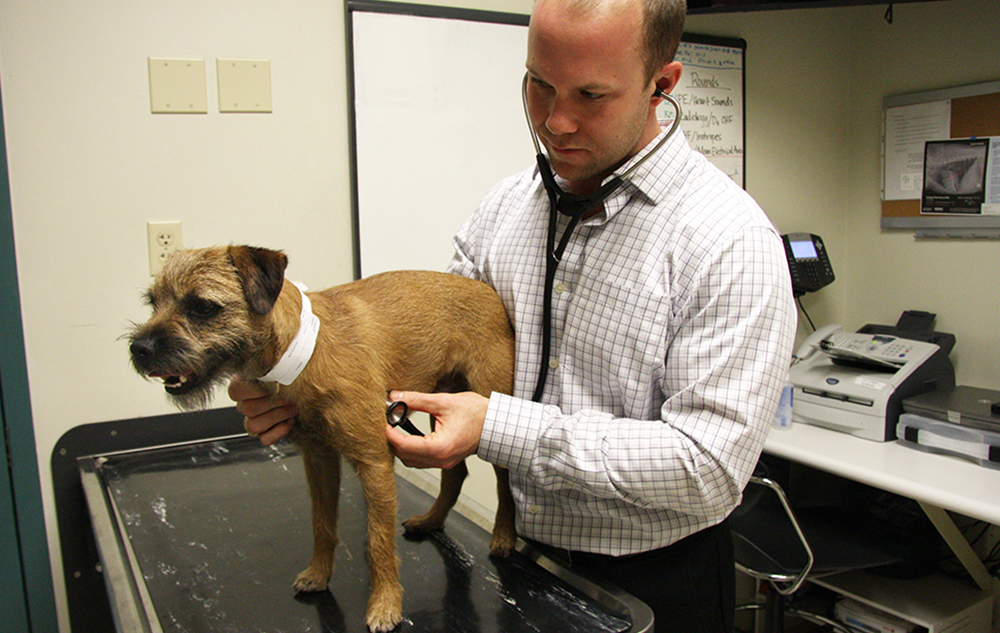 My pet has a heart murmur. What does that mean?
My pet has a heart murmur. What does that mean?
Normally there are two distinct sounds heard when your veterinarian listens to your pet’s heart. Often these sounds are referred to as “lub” and “dub.” A heart murmur is an abnormal additional heart sound caused by turbulent blood flow that can be heard between the “lub” and the “dub.”
The presence of a heart murmur may be one of the first hints that your pet has heart disease. There are multiple possible causes of a heart murmur, but the exact diagnosis will require further tests. Once the diagnosis and severity of your pet’s heart problem is determined, you and your veterinarian can discuss whether immediate treatment is necessary and how this heart disease will affect your pet in the future.
What causes a murmur?
Murmurs are created by turbulent blood flow. Normally the blood in the heart flows undisturbed and smoothly (laminar flow). However, if there is a narrowing or the valves do not close properly, blood will flow rapidly (turbulence). This turbulent blood flow is what your veterinarian will hear.
The murmur can be rather quiet or very loud. Sometimes you can even feel it on your pet’s chest. The intensity of the murmur does not necessarily tell us how bad the heart disease is, but it is an important clinical finding that helps your veterinarian monitor your pet long-term and communicate with other veterinarians. To better explain the possible causes of a murmur, we will start with a brief description of the heart.
The heart is a muscular organ in the chest. It functions as a mechanical pump and moves blood through the vessels in the body. The heart has two sides, a right side and a left side. Each side has an upper chamber (atrium) and a lower chamber (ventricle).
Oxygen-poor blood from the body enters the heart at the right atrium, which contracts and moves blood into the right ventricle. The contraction of the right ventricle now pumps blood through the pulmonary artery into the lungs. In the lungs this blood is replenished with oxygen.
The oxygenated blood then returns to the left side of the heart. It first enters the left atrium. From here the blood is forced into the left ventricle. The left ventricle then contracts and pumps blood into the aorta, delivering oxygen-rich blood to the body.
Each side of the heart has a one-way valve located between the atrium and ventricle and another valve between the ventricle and big vessels. The mitral valve separates the atrium and ventricle on the left side, whereas the tricuspid valve separates these chambers on the right side. The aortic valve separates the left ventricle from the aorta, and the pulmonic valve separates the right ventricle from the main pulmonary artery.
All of these valves function as one-way valves with a forward flow direction. Failure to properly open or close will disturb laminar blood flow and result in a murmur. Abnormal connections between vessels or “holes” in the heart that abnormally connect heart chambers will also cause heart murmurs. Other reasons for murmurs include narrowing within chambers and blood vessels, fever and anemia.
My pet has an innocent or benign murmur. Should I be worried?
Innocent murmurs are often found in puppies (“puppy murmurs”) and cats of any age. In puppies they normally disappear by the time the puppy is five or six months old. These murmurs usually are not related to heart disease.
What does it mean if the murmur is caused by congenital heart disease (CHD) or acquired heart disease?
If your pet has a murmur caused by CHD, it means the murmur has been present since birth. Pets with congenital murmurs are born with a heart defect. It is important to identify the cause of the murmur early on because some congenital defects can be fixed.
An acquired heart murmur is a murmur that appears later in life. The most common causes are mitral valve disease in dogs and hypertrophic cardiomyopathy in cats.
My pet has a murmur. What is the next step?
A murmur is just a clinical finding and does not tell us the final diagnosis. Even though certain conditions are more common than others, without further tests (such as echocardiograms or X-rays) we cannot establish a diagnosis, the severity of disease or what this might mean for your pet in the future. Knowing about the disease will help you and your veterinarian make an educated decision about treatment.
How do we treat a murmur?
The murmur itself will not be treated, but the underlying condition will be if indicated. Treatment decisions will be made based on diagnosis, severity of disease and other circumstances.



